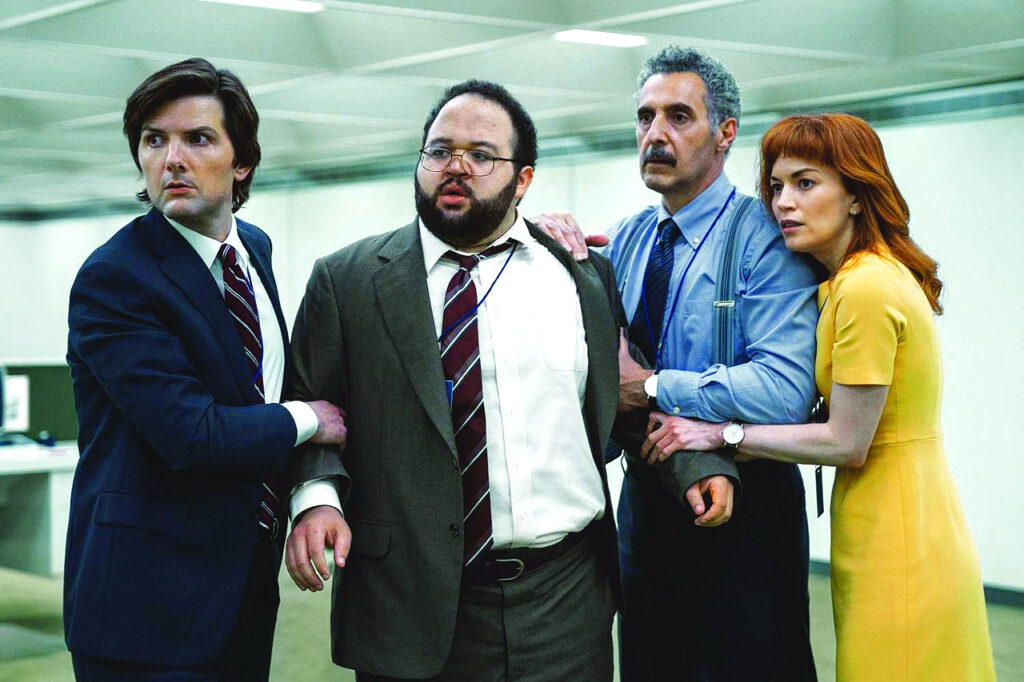Paranoia of a large silver plate
Karachi:
It’s been three years since retirement first dug a hole in our collective consciousness, and together with it, the vision of corporate life is very accurate, unsettling, and even the most mundane office corridors feel vaguely threatening I’ve started. With its standout fluorescent lighting, labyrinth corridors and the creepy blanks of Lumon Industries employees, the Apple TV+ series took a 9-5 dr voyage, turning it into existentially miserable.
With the first second season since January 17th airing and the psychological thrills strengthened, the waiting times between episodes could send dedicated fans to explore a dedicated world. Few shows achieve the delicate balance of psychological plot, corporate satire, and the resignation of a surprising mystery of reality, but no one comes near you. Five exploiting the same anxiety peels off layers that peel off the constantly transparent boundaries between identity, control, and work and self.
“development”
With retirement, when you think about the divine power of the corporate overlord, the developer of Alex Garland pushes that idea even further – like determinism, quantum mechanics, and more religious cults than the company A titan of working technology. In the center, a software engineer whose boyfriend mysteriously dies after being adopted in the secret development programme of Amaya, a Silicon Valley Beret giant run by Nick Offerman in Full Enigmatic Gurumode. There is Lily Chan.
There is similar accuracy here. A barren, monolithic space, an oppressive corporate aesthetic, an unsafe from the grasp of an employer – a creeping sense of not even free will. But Severance removes memory, while Devs dismantles the concept of choice. And like Lumon, Amaya is not just a workplace, it is a system that consumes everything, and it is a system that determines reality itself.
“Homecoming”
For those attracted to the hard-to-retirement corporate plot, Homecoming brings about equally smooth and paranoid devices falling into institutional domination. The first season, led by Julia Roberts, unfolds in two timelines. One is that her character Heidi Bergman works in an facility designed to rehabilitate soldiers, while the other is that he has no memory of working there at all.
Comparisons are easy to do – both manipulate memory as a tool of control, stripping agency characters, and being eeriely accurate, almost confined to a preservative environment. And like Lumon’s “cut” floor, the homecoming facility is a marginal space of its own kind, with reality bent enough to soothe it deeply. If your retirement has recertified fine prints in your personnel documents, your homecoming will have you on the sidelines of all the last bureaucratic processes in your life.
‘maniac’
Is the company going too far? check. A surrealistic horror poses as self-improvement? check. A meticulously designed retro physical aesthetic? Maniac has all the works of his retired brothers, but he is swapping workplace drighers for drug experiments.
Prerequisite: Two strangers, Annie (Emma Stone) and Owen (Jona Hill), are enrolled in a drug trial that promises to cure all psychological illnesses. Below is a quirky, kaleidoscopic journey through simulated reality, from Tolkien-esque fantasy lands to spice thrillers influenced in the 70s.
It is not only visual ambitions, but emotional depth that makes the kinship of maniacs a resignation. Both shows use their odd facilities to explore painful humans. It’s a desperate need to escape, rewrite and compartmentize. And like Lumon of retirement, Maniac’s Neberdine Pharmaceutical is an institution with far more surprising motivation than it is advertised.
‘One side’
If what you loved about retirement is the idea that it can exist without knowing its meticulous, bureaucratic identity, or any other version, then your counterpart should be next on your list.
JK Simmons stars as Howard Silk, a gentlely controlled UN employee who discovers his agency is keeping a secret. His double, living on the other side, is everything he isn’t. It is strengthened, confident, and deeply entrenched in the spy war between the two worlds.
The method of resignation involves interrogating work-life balance, and your counterpart interrogating your destiny. Both lie not just with who we are, but with who we are allowed to become. And both create spaces that govern those identities, whether it’s Lumon’s endless white corridors or the shadowy governmental institutions of their counterparts.
“Black Mirror”
An obvious choice? perhaps. But there’s a reason why Black Mirrors remain a technology-driven existential horror benchmark.
Though it’s not a single cohesive story, many of the episodes elicit Severance’s important unrest. The slippery ethics of corporate power (white Christmas), the commercialization of memory (your whole history), and the fear that divides your identity into things that are unrecognizable (USS Calister). And like retirement, it’s not about the technology itself, than the way it erodes the human condition. This is how innovating the wrong hands can be a tool for trapping rather than liberation.

